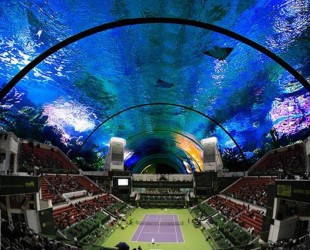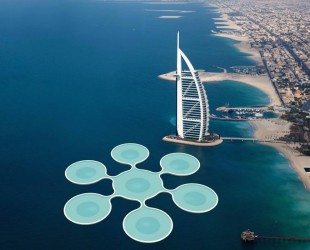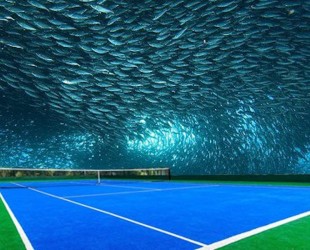Dubai seem to love their tennis courts. In 2005, the world’s highest tennis court was built atop the 1,000-foot-tall Burj al Arab Hotel. And now, the city may venture beneath the sea with the world’s first underwater tennis court.

(Rendering courtesy of 8+8 Concept Studio)
Earlier this year, Polish architect Krystztof Kotala, Founder of 8+8 Concept Studio, proposed to build an underwater complex situated offshore in the Persian Gulf, between the Burj al Arab and the Palm Jumeirah islands in the United Arab Emirates. The proposed structure will house seven courts, each with rooftop coral reef designed to build an illusion of a natural atoll.
While the innovative idea drew much interest from potential spectators, it also raised many technical concerns for engineers and developers. Sara Fray, Director of Engineering and Technical Services at the Institution of Structural Engineers in London, reportedly pointed out that the transparent ceiling would require a continuous pane of glass measuring at least 108 feet-wide and weigh “possibly a hundred tons” to accommodate the court and spectators. Aside from the major concern of leakage, Fray also noted a few things that the complex would need, including a feasible structure that could withstand earthquakes and tsunamis, and an efficient connection to the surface as emergency exit. She even questioned whether tennis players could play in the courts, as it would be difficult to control the light refraction.

(Rendering courtesy of 8+8 Concept Studio)
Beyond these technical issues, the development is also extremely expensive to build. Estimated to cost a whooping $1.7 -$2.5 billion, according to Kotala in an interview with CNN, the architect believes the project to be a “combination of ecology, technology and sport” with strong commercial potential. Yet, there was no investor as of May. Since then, Kotala has been in talks with potential U.S. investors, but no further details can be revealed at this point.
In regards to the technical issues, the Polish architect noted that the curvature of the glass is not a problem. “It’s a matter of using the right mullions (vertical bars between the panes of glasses) to build an airtight glass case.” The architect does not consider the refraction to be a major issue, as the variety of light or refractions is prevalent in the whole environment, not just under water. He stated, “In matters of design and glass, there is no doubt that 95% issues that may limit the project have been resolved at this point.” So as the architect is busy refining the concept drawings for the entire complex, his biggest concern right now is whether there’s enough time before the Expo 2020 Dubai to build this underwater tennis court.

(Rendering courtesy of 8+8 Concept Studio)
Original Source: http://www.forbes.com/sites/eustaciahuen/2015/11/30/latest-look-at-the-worlds-first-underwater-tennis-court/
